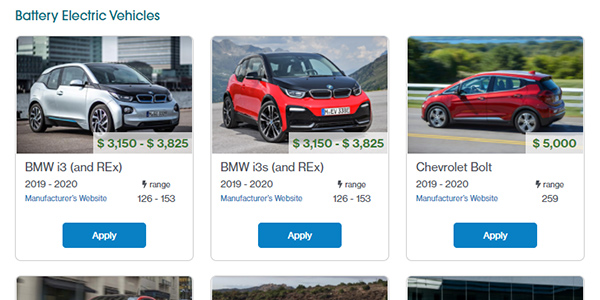New Jersey regulators on Wednesday approved a “shared responsibility” model for building a public electric vehicle charging network that will have utilities provide the wiring infrastructure and private investors owning the charging equipment in most instances (QO20050357).
The New Jersey Board of Public Utilities’ order will have ratepayers fund the utility investments in “make ready” infrastructure for light-duty EVs. Non-utility entities — site owners, property management companies, and EV service equipment companies — will install and operate charging stations using private capital.
Electric distribution companies (EDCs) would only be allowed to own the charging equipment in areas of “last resort” — locations that fail to generate private sector requests for make-ready infrastructure after at least 12 months.
The BPU’s action implements the Electric Vehicle Act of 2020, which set a goal of registering at least 330,000 light-duty, plug-in EVs by the end of 2025, at least 2 million by 2035, and 85% of all new light-duty vehicles sold or leased by 2040.
According to the state’s Energy Master Plan, transportation generates 42% of the state’s net greenhouse gas emissions, making EV adoption essential to meeting the state’s goal of 100% clean energy and an 80% cut in emissions from 2006 levels by 2050.
NJ Lags
“To date, the private sector has not made a business case to install EV chargers without a critical mass of EVs on the road, and consumers hesitate to purchase EVs without the ability to charge away from home,” the order said. “As a result, the adoption of EVs has lagged. The circular problem continues as the EVSE [electric vehicle service equipment] infrastructure companies are disinclined to develop publicly available charging sites where there is an uncertain amount of demand for their services. …
“While New Jersey ranks near the bottom of EV adoption, stakeholders generally agree that an investment in charging infrastructure to address range anxiety coupled with the BPU’s new EV incentives will serve to spark EV adoption and confidence in the emerging technologies.”
New Jersey is also encouraging the transition by offering residents purchasing or leasing a new EV a subsidy of $25/mile of EPA-rated all-electric range. The maximum payment is $5,000 for vehicles with a range of more than 200 miles.
‘Make Ready’

EVSE infrastructure companies or site hosts would notify their EDC of their intent to install EVSE at a location. The EDCs would develop and own the transformers, meters and other make-ready infrastructure.
The order says such sites will be deemed “used and useful” — allowing EDCs to recover their investments — even if the make-ready site is not immediately used. “While this does not exempt the utility from showing that it was prudent in the manner in which it made the site charger-ready, the utility should not be at financial risk for putting in an installation that was duly authorized pursuant to this order,” the board said.
EDCs will be permitted to begin work without board review for any make-ready installation expected to cost less than $100,000. Projects estimated between $100,000 and $250,000 will be subject to a “soft cap” requiring the EDC to notify board staff and the New Jersey Division of Rate Counsel; it will be allowed to begin work unless staff or another party objects to the project within 60 days. Projects expected to exceed $250,000 will be subject to a “hard cap” requiring board approval.
The order sets the minimum filing requirements for light-duty EV infrastructure proposals from EDCs and requires them to file their plans by Feb. 28, 2021. EDCs must propose ways to minimize the barriers to EV adoption created by demand charges. Filings from two utilities, Public Service Gas and Electric and Exelon’s Atlantic City Electric, are already under review by the BPU.
The Electric Vehicle Act of 2020 set the following goals for plug-in vehicle (PIV) adoption:
- At least 25% of state-owned non-emergency light-duty vehicles will be PIVs by Dec. 31, 2025.
- At least 400 DC fast chargers (at least 50 kW) available for public use at no fewer than 200 charging locations by Dec. 31, 2035.
- At least 1,000 Level 2 chargers shall be available for public use across the state by Dec. 31, 2025. The state currently has more than 400.
- At least 15% of all multifamily residential properties shall be equipped with EV chargers by Dec. 31, 2025.
The Department of Environmental Protection, consulting with the BPU, will establish goals for electrification and infrastructure development for medium- and heavy-duty vehicles such as transit and school buses by Dec. 31, 2020.
The board acknowledged concerns that EVs will not contribute to the Transportation Trust Fund, which generates revenues for maintenance and road repairs through a tax on gasoline and diesel sales. Staff said stakeholders’ consensus was to develop a user fee for EV drivers; it pledged to work with the state Department of Transportation to address the issue.
The board adopted staff’s recommendation that it allow charging infrastructure owners flexibility to adopt payment methods that meet their needs, noting that the 2020 law established sale of electricity at an EV charger as a service, not a regulated sale of energy.




